Technology
10 Trusted Customer Feedback Tools Used by Many Businesses
Published
3 hours agoon
By
Skylar Lee
While often overlooked, customer feedback is a crucial factor in running a business. It provides an objective view of your company, product, or service from the people who matter. If you want to leverage this source of perspective, you should use a customer feedback tool. Here’s our list of the top 10:
What Are The Different Types of Customer Feedback?
Customer feedback cannot be simplified into one category. Customers may give their opinions regarding your business, product, service, or website. But what types of feedback can you get from them?
- Online reviews
- Ratings
- Customer service feedback
- Complaints
- Feature requests
- Customer satisfaction feedback
- Questions
How Can You Collect Customer Feedback?
Now you know what feedback customers can give you, here are ways to collect customer feedback:
- Text message
- Surveys
- Website analytics
- Interviews
- Social media
With these in mind, check out the tools below that can show us how you can collect customer feedback.
1. SurveyMonkey

When it comes to surveys, SurveyMonkey is one of the leading brands. You can create surveys faster with AI. With their AI, they can generate questions for your form. Plus, you can customize your surveys by adding brand colors and other assets. SurveyMonkey uses a global panel to help you collect data from different platforms. Then, you can analyze data by going to the dashboard.
Aside from those, you can raise your Net Promoter Score and produce marketing content from customer feedback with their TechValidate feature.
Pricing:
- Team Advantage – $30/user/mo
- Team Premier – $92/user/mo
- Enterprise – Contact for pricing
2. Typeform

Typeform is another popular survey and form tool for many businesses to get customer feedback from. With Typeform, you can create surveys and polls. Plus, you can research your customers.
In addition, you can ask customers to give their feedback via video through videoask. With this, you can schedule an appointment to interview them, or they can send a video of them providing you with feedback.
Pricing:
- Basic – $29/mo
- Plus – $59/mo
- Business – $99/mo
- Enterprise: Contact Sales for pricing
3. AskNicely
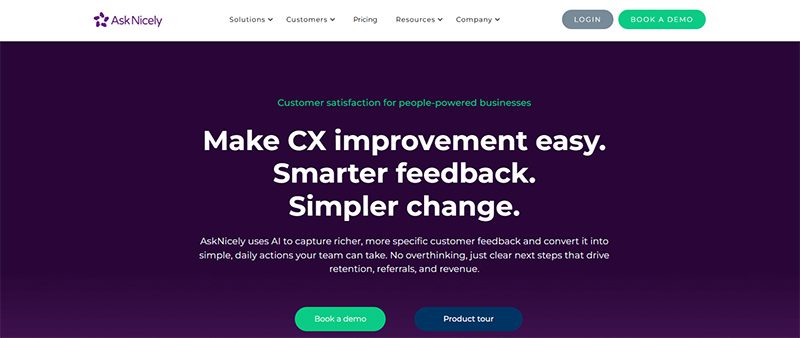
Enhance the customer experience by using AskNicely. This tool will help you get more insights into your business through reviews. You can nudge them into writing a review for you by sending an automatic notification to them. Or, you can ask for feedback via a survey tool on your website. Plus, you don’t have to analyze the data manually.
AskNicely also has a dashboard with all reviews and feedback to understand your customers better.
Pricing:
- Learn – $449/mo (billed annually)
- Grow – $849/mo
- Transform – $999/mo
4. Survicate

Survicate helps you get insights into your customers through different channels. It’s easy to build surveys with this tool since you can drag and drop elements on the form. If you don’t want to create a survey from scratch, they have templates and common question types you can add to your form. Aside from that, you can customize your form by adding branding assets.
Pricing:
- Free
- Essential plans – there are two options to choose from, starting from $79/mo
- Advanced – starts at $299/mo with two other options to choose from
5. Google Forms
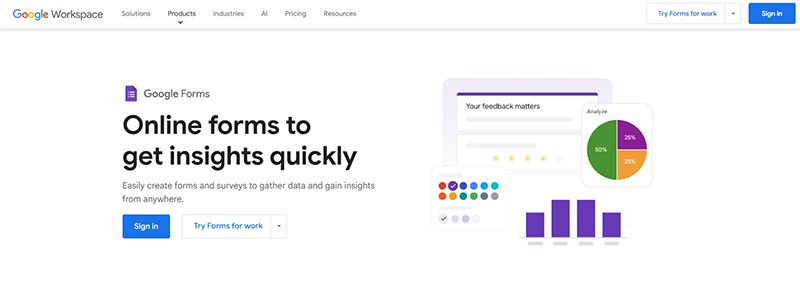
If you want a forever-free option to get customer feedback, look no further because Google Forms is here to save you money. With Google Forms, all you need is a Google account, and you’re all set. You can choose templates based on what feedback you will need. Or you can create a survey form from scratch. To get and analyze data, link your form to Google Sheets so you can understand your customer base more easily.
Pricing:
- Free
6. Usersnap
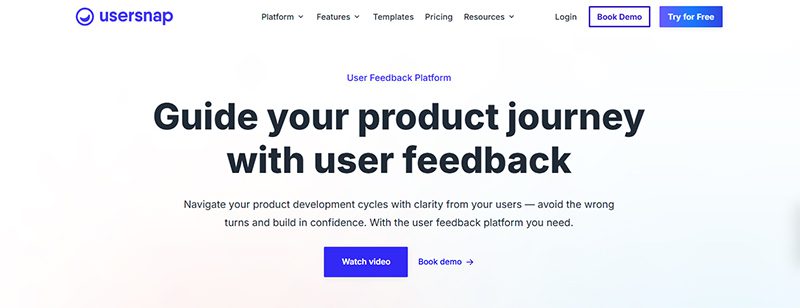
Do you need a feedback tool to improve your user experience on an app or website? Usersnap is one of the most popular customer feedback tools to try! You can ask users through polls and surveys how to improve your website. In addition, you can send those surveys or forms via email or ask them directly while they’re browsing.
It’s another great app if you want users to report bugs you might have missed. You can also ask them for feedback on how to improve your product or service.
Pricing:
- First 20 feedback items free
- Startup – $39/mo
- Growth – $89/mo
- Professional – $159/mo
- Premium – $319/mo
7. SatisMeter
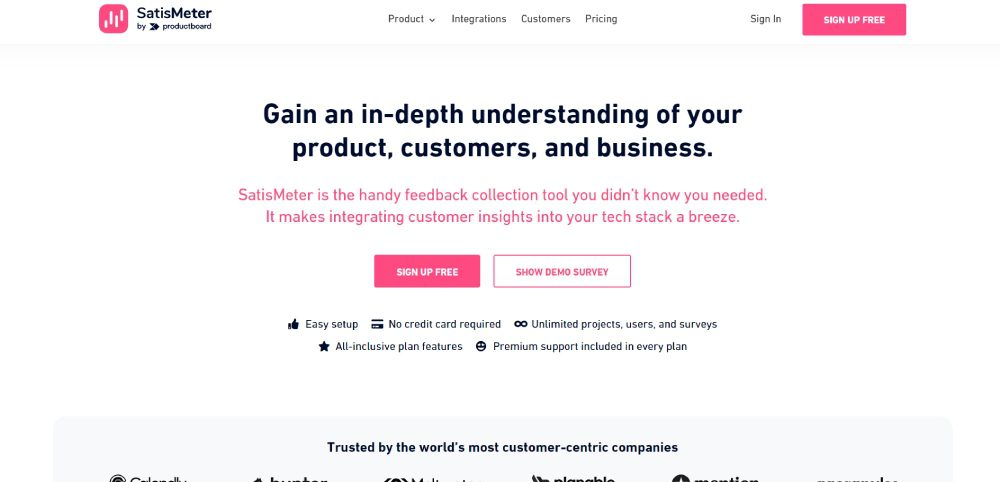
If your NPS matters to you, SatisMeter is the best tool for you. You can create a quick NPS survey with this tool. Plus, you can use other satisfaction surveys, such as the Customer Satisfaction Score and Customer Effort Score. In addition, you can use their templates to make an NPS survey without the hassle. And you can customize your surveys and review what customers say about you.
Pricing:
- Free (5 responses/mo)
- Growth (1,000 responses/mo) – $199/mo
- Enterprise – Schedule a demo
8. Bazaarvoice
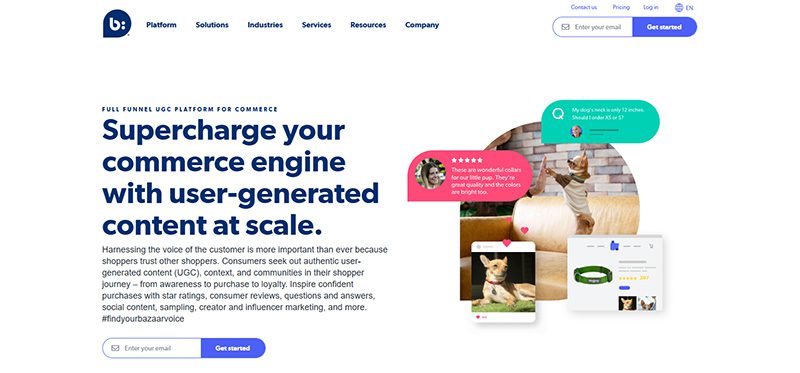
Bazaarvoice is the ideal customer feedback tool for brands and eCommerce sites. With this tool, you can gather all reviews and ratings in one place. One of the best features of Bazaarvoice is reminding your customers to write a review through email and text. Plus, with Bazaarvoice, you can instantly reply to customer reviews. In addition, ask them questions to understand how your brand is doing.
Pricing: Book a call with them
9. Qualaroo
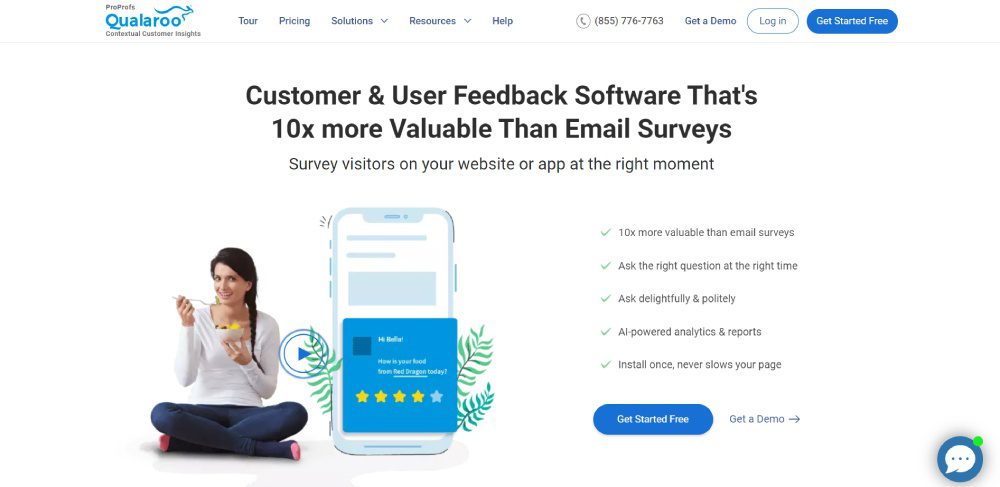
Qualaroo is one of the most popular customer feedback tools for most businesses. For one, you can send email surveys and use their survey templates. Two, they have an AI-powered assistant to help you understand reports better. Finally, with the reviews you collect, you can use them for marketing purposes and get more people to buy from you and leave more reviews.
Pricing:
- Free (up to 50 responses)
- Essentials – $39.99/mo
- Business – $69.99/mo
- Enterprise – $149.99/mo+
10. Trustpilot

Trustpilot is one of the go-to places for many customers and clients to leave reviews about businesses. But as a business, you can use Trustpilot to respond to customers. Plus, you can invite people to leave a review. Moreover, you can flag or report spam reviews, giving your business authenticity. Aside from those, you can integrate your Trustpilot account into social media accounts and use reviews as marketing assets.
Pricing:
- Free
- Plus – from $299/domain/mo billed annually
- Premium – from $629/domain/mo billed annually
- Advanced – from $1,099/domain/mo billed annually
- Enterprise – pricing upon request
You may like
Technology
10 Popular Competitor Research Tools To Stay Ahead of the Game
Published
4 hours agoon
August 7, 2025
In today’s hyper-competitive digital landscape, you need to find your competitors, know what they’re doing, and how you can do it better. Enter competitor research tools.
Whether you’re a solo entrepreneur, a growing startup, or part of a seasoned marketing team, the right tools can give you an edge—helping you uncover your rivals’ SEO strategies, ad campaigns, content performance, and even email tactics.
Here are 10 tried-and-tested competitor research tools that can help you analyze, adapt, and outperform your competition across multiple marketing channels.
1. Sprout Social
Sprout Social helps businesses optimize their social media strategies through powerful analytics and competitor insights. In 2025, it offers even deeper data visualization, audience benchmarking, and trend monitoring through its AI-enhanced platform.
Features:
- Competitive analysis across Instagram, Facebook, X, and LinkedIn
- Premium Analytics for interactive charts and reports
- Social listening and sentiment tracking
Pricing: Starts at $199/seat/month (Standard Plan)
2. Phlanx
Phlanx remains a quick and lightweight tool for measuring Instagram engagement and influencer authenticity. While more specialized than some all-in-one platforms, it still serves a purpose for influencer and competitor engagement audits.
Features:
- Instagram engagement rate calculator
- Audit tools for verifying influencer credibility
- Compare brand engagement on Instagram
Pricing: Starts at $39/month
3. Semrush
Semrush is still one of the top SEO and digital marketing tools in 2025. It offers a robust competitor analysis suite, perfect for benchmarking keywords, tracking backlinks, and studying advertising strategies.
Features:
- Analyze competitor keywords, rankings, and ads
- Backlink tracking and gap analysis
- Traffic overview and market explorer
Pricing: Rates vary by toolkit; for Traffic & Market Plans, the Pro Plan costs $289/mo
billed annually. Social Plans, meanwhile, start at $20/mo billed annually.
4. Ahrefs
Ahrefs is a go-to tool for in-depth backlink and organic keyword research. In 2025, its improved UI and expanded keyword database make it ideal for SEO pros tracking high-performing competitor content.
Features:
- Analyze top-performing competitor pages
- Keyword gaps and traffic estimations
- Backlink profiles and referring domains
Pricing: Starts at $129/month
5. BuzzSumo
BuzzSumo is excellent for content discovery and competitive benchmarking. It lets you see what content is performing best in your niche and how your competitors are engaging audiences.
Features:
- Discover top-performing articles by topic or domain
- Analyze content by engagement across platforms
- Monitor competitor content performance
Pricing: Starts at $199/month
6. Similarweb
Similarweb gives you a comprehensive view of competitor traffic, audience behavior, and acquisition strategies. It’s widely used by marketers, analysts, and investors to understand market dynamics.
Features:
- Website traffic overview by source (direct, referral, social, organic)
- Competitor benchmarking and industry trends
- Referring sites and destination sites
Pricing: Web Intelligence plans start at $1,500/ year or $199/month
7. Feedly
Feedly isn’t a direct competitor analytics tool, but it’s invaluable for tracking competitor content. It aggregates blog posts, press releases, and industry news in one customizable feed.
Features:
- Monitor competitors’ content in real time
- Create boards for content curation
- AI-powered Leo assistant for prioritizing trends
Pricing: Free | Pro starts at $6.99 per month billed annually
8. WooRank
WooRank is a technical SEO and digital performance tracker that lets you compare your website with up to three competitors. It provides clear insights on SEO issues and opportunities.
Features:
- Side-by-side SEO comparison with competitors
- Keyword tracking and site performance scoring
- Backlink data and mobile optimization reports
Pricing: Starts at $89.99/month
9. MailCharts
MailCharts helps brands understand how competitors approach email marketing. It aggregates and analyzes email content from various brands to uncover trends, timing, and tone.
Features:
- Email frequency, subject line, and campaign benchmarking
- Compare campaigns against industry leaders
- Access to a large archive of real email campaigns
Pricing: Free limited access | Premium plans start at $149/month
10. Owletter
Owletter lets you monitor competitor email campaigns by collecting and analyzing emails sent to subscribed inboxes. It’s a great tool for uncovering trends and tactics in email marketing.
Features:
- Automatically captures and stores emails from competitors
- Tracks send times, frequency, and formatting
- Alerts for notable changes or seasonal shifts
Pricing: Starts at $29/month
Keep an eye on your competitors– it’s an essential business strategy.
To stay ahead of the game, you must keep a close eye on your competition. While learning from your competitors can seem intimidating, it’s okay if you’ve chosen suitable competitor analysis tools for your organization. Remember that these competitor research tools are necessary for fine-tuning your marketing strategy. And using the right tools allows you to run your analysis efficiently and focus more on your goals.
Technology
Top 10 Recruiting Tools Business Owners Should Know About
Published
4 hours agoon
August 7, 2025
Hiring the right people is crucial for any business, as proven by the explosion of the online recruiting industry into the mainstream. There are now plenty of recruitment tools that make it easy for companies to find new employees. However, not all tools are created equal. Here are our best recruiting tools you can choose from:
1. iMocha

A cloud-based pre-employment assessment software, iMocha helps companies assess job applicants’ skills and knowledge. It offers a wide range of tests and quizzes covering topics such as aptitude, technical skills, language proficiency, personality, and more.
The tool provides customizable assessments, real-time reporting, and analytical insights to help organizations make informed hiring decisions. It also integrates with various applicant tracking systems and other HR software for seamless workflows.
2. Predictive Index

One of the widely used recruiting tools to build high-performing teams, Predictive Index, helps employers identify and select suitable candidates for their needs. They do this by measuring cognitive abilities, behavioral traits, and job fit. It also provides insights into team dynamics and helps employers create successful teams.
Predictive Index helps make the recruiting process more efficient, accurate, and cost-effective. With over 60 years of experience, 7,000+ clients, and 37.5 million assessments, this tool is widely renowned in its field.
3. Freshservice

One of the best cloud-based HR software and recruiting tools, Freshservice, is designed to help recruiters to post job openings and source, track, and hire the best talent. It offers a variety of features, including applicant tracking, recruitment automation, onboarding, career pages, employee profiles, and more.
Freshservice is designed to streamline the entire recruitment process and make recruiting more manageable and faster. It also allows recruiters to keep track of the progress of their recruitment efforts and collaborate with their teams. Additionally, Freshteam offers tools to engage and nurture candidates with automated emails and text messages.
4. Harver
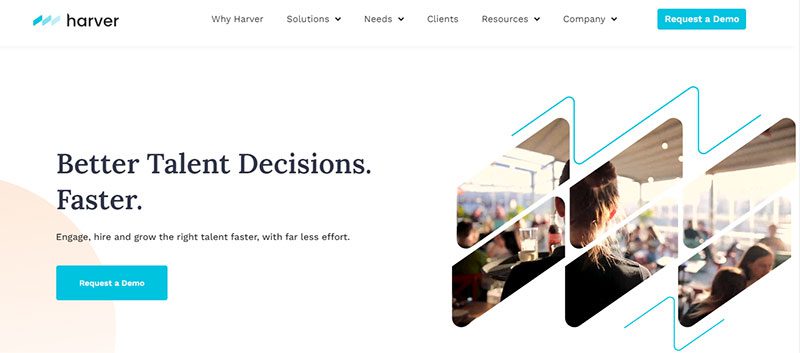
Powered by AI technology, Harver is a cloud-based recruitment platform designed to streamline the recruitment process for HR teams. It helps recruiters automate the process by leveraging artificial intelligence and machine learning algorithms to help them find the best-suited candidates for their roles.
The platform provides features such as job posting, candidate screening, automated emails, and a candidate database. It also allows recruiters to analyze candidate data and track the performance of their recruitment campaigns. Harver also provides tools to build a company’s employer brand and reach out to passive candidates.
5. HackerRank
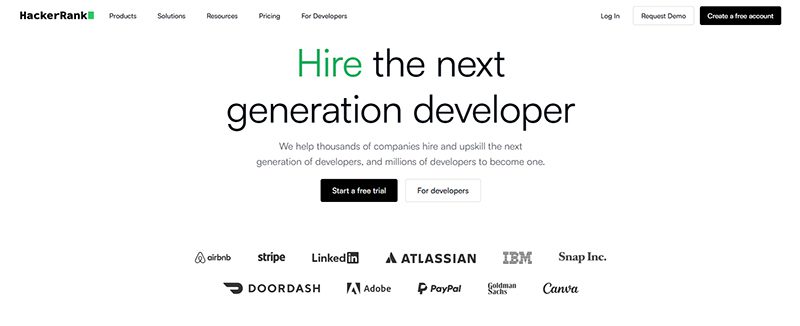
An online coding platform and recruiting tool, HackerRank, allows companies to evaluate and hire software developers based on their coding skills. It offers various coding challenges and algorithms that candidates can complete to demonstrate their technical skills. Companies can customize the challenges and use these to assess candidates’ problem-solving abilities, coding proficiency, and knowledge of specific programming languages.
HackerRank also provides a variety of resources to help employers create and manage their own coding challenges. It offers tutorials, sample tests, and other resources that can help employers develop and customize their coding challenges.
6. Jobsoid
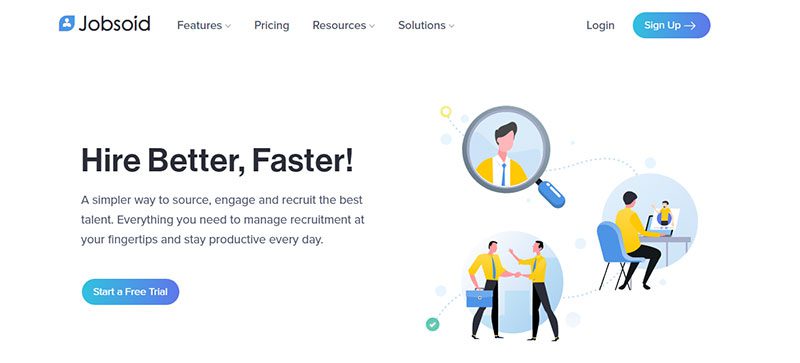
An AI-powered recruitment platform, Jobsoid is designed to help businesses streamline and automate their recruitment processes. It enables users to post jobs, manage candidates, and track their progress in a single dashboard. Jobsoid’s features include resume parsing, automated candidate sourcing, interview scheduling, applicant tracking, and background checks.
It also offers reporting and analytics to help employers measure the success of their recruitment efforts. It is a comprehensive solution for businesses of all sizes looking to make their recruitment processes more efficient and effective.
7. TestGorilla
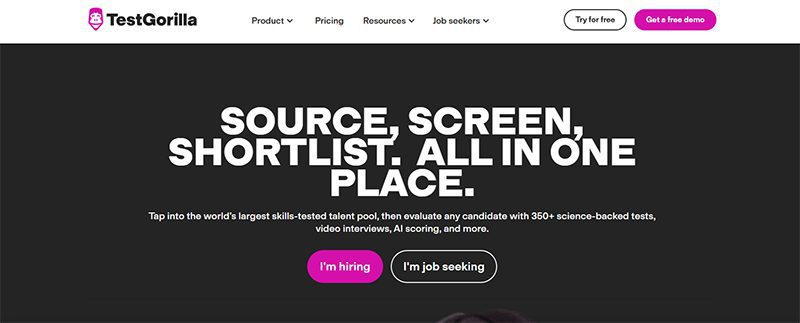
An innovative recruiting platform, TestGorilla is designed to simplify the hiring process for companies. It offers employers powerful tools for creating custom job postings, tracking applicants, engaging in automated communication, and assessing and screening candidates.
One of the standout features of TestGorilla is its comprehensive analytics dashboard. This dashboard provides companies with the ability to measure and compare candidate performance, giving them the insights they need to make informed hiring decisions. The dashboard provides data such as the number of applicants, the number of qualified candidates, and the average time it takes to fill a position, among other key metrics.
8. Hoops

Hoops is one of the most popular recruiting tools designed to help employers find, attract, and hire the best talent. It uses data-driven technology to identify job seekers who fit a given job description and then provides employers with detailed profiles of the best candidates. Through Hoops, employers can quickly search through millions of resumes, track applicants, and manage the hiring process.
It also provides employers with analytics to help them better understand their recruitment process, such as which sources are providing the best applicants, how long it takes to fill positions, and which jobs have the best ROI.
9. ProProfs
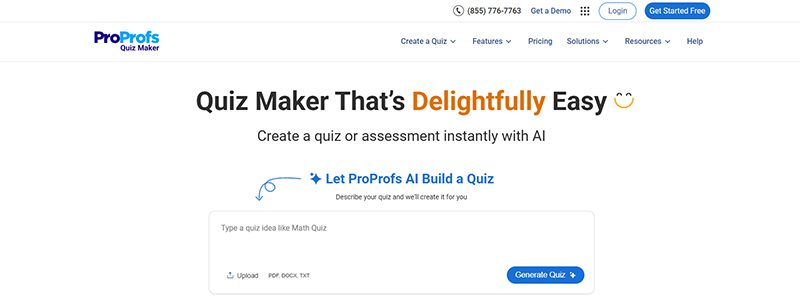
An exceptional test-creation tool, ProProfs doubles as a powerful recruitment assessment tool. It offers an all-in-one solution for creating and administering assessments, such as quizzes and tests. Its user-friendly platform makes it easy for users to create and administer assessments in a variety of formats, including video interviews. With a wide range of question types available, users can tailor their assessments to meet their specific needs.
ProProfs also comes equipped with a range of security and accuracy features. The platform offers automatic grading to streamline the grading process and proctoring settings to prevent cheating, among many others.
10. Spark Hire
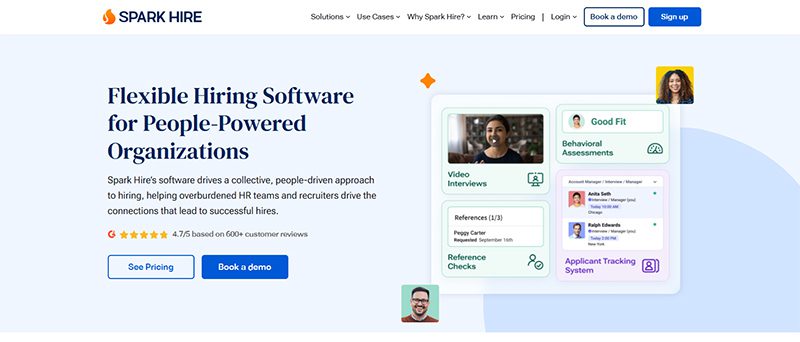
Simplifying the recruitment process for employers, Spark Hire is a comprehensive online video platform. With its user-friendly interface, employers can quickly create custom job postings, receive and review applications, conduct video interviews, assess candidates, and make informed hiring decisions.
Spark Hire utilizes AI technology to enhance the candidate experience, making the recruitment process interactive and engaging, accessible from anywhere online or through mobile devices. To further aid in the hiring process, Spark Hire provides insightful analytics to track and measure the success of recruiting efforts.
Final Thoughts
Recruitment processes can be made more accessible with the right tools and approach. Business owners can find the best options that fit their needs by rethinking the job market and considering how it can drive growth. Once they define their goals, they can identify and use the right tools and techniques to find and hire top talent.
Technology
Level Up Your Marketing with These 10 Content Marketing Tools
Published
21 hours agoon
August 7, 2025By
Skylar Lee
Content marketing has evolved rapidly. And in 2025, it’s more than just blog posts and email campaigns. With AI-driven content marketing tools, shifting social platforms, and higher audience expectations, you need the right stack of tools to stay ahead.
Types of Content Marketing Tools
There are various content marketing strategies, such as blogging, email marketing, video marketing, social media marketing, and more. That said, if you’re tackling different marketing types, you need assorted tools to make your content marketing strategy work.
But what types of tools do you need?
- Analytics
- Management
- Creation (writing blogs or copy, graphics, and videos) and editing
- Publishing
- Promotion
Here are a few tools to check out if you’re looking for the most popular content marketing tools:
1. Penji
Great content needs great design—and that’s where Penji comes in. As an unlimited graphic design service, Penji helps marketers scale visual content quickly without hiring a full-time designer. Whether you’re creating social media graphics, blog illustrations, ad creatives, or infographics, Penji’s team of vetted designers can handle it all.
Features:
- Unlimited design requests and revisions
- 24–48 hour turnaround for most projects
- Built-in platform for submitting briefs, reviewing, and leaving feedback
Pricing:
- Business – $499/mo
- Marketing & Ads – $995/mo
- Agency – $1,497/mo
2. HubSpot
If you’re looking for an all-in-one platform to manage your content marketing, HubSpot remains one of the most powerful tools. Trusted by customers globally, HubSpot helps teams streamline content creation, automate marketing workflows, and track ROI with ease. It also offers access to the HubSpot Academy, where marketers can upskill with free certifications and in-depth courses.
Features:
- Create and manage blogs, emails, landing pages, and social media content
- Built-in SEO recommendations and content strategy tools
- AI-powered content assistant to generate and optimize copy
Pricing (Marketing Hub for Individuals and Small Teams):
- Free tools
- Marketing Hub Starter – $9/mo/seat (billed annually)
- Starter Customer Platform – $9/mo/seat (billed annually)
- Marketing Hub Professional – US$800/mo (billed annually)
3. SEMRush
If blogging or SEO-driven content is at the heart of your marketing strategy, SEMrush is a powerhouse you can’t afford to skip. This all-in-one platform supports everything from keyword research to competitive analysis, content optimization, and even AI writing assistance. In 2025, SEMrush continues to be a go-to tool for marketers who want to improve organic visibility and outrank competitors.
Features:
- In-depth keyword overview and keyword manager
- Organic research and traffic analytics
- Track competitor rankings and backlink profiles
Pricing (as of 2025):
- Pro – $139/mo
- Guru – $249/mo
- Business – $499/mo
4. Trello
If you’re looking for a simple and highly visual way to manage your content marketing workflow, Trello remains a top choice. This kanban-style project management tool, now fully integrated with Atlassian’s ecosystem, makes it easy to organize campaigns, build editorial calendars, and collaborate with your team in real-time. With its intuitive interface and powerful automation options, Trello is perfect for small teams and solo marketers alike.
Features:
- Drag-and-drop kanban boards to organize tasks and campaigns
- Customizable cards with checklists, attachments, and due dates
- Built-in Butler automation for recurring tasks
Pricing:
- Free
- Standard – $6/user/mo
- Premium – $12.50/user/mo
- Enterprise – $210.00 annual price per user
5. Clipchamp
If you’re new to video marketing, Clipchamp is one of the most user-friendly video editing tools you can find. Now fully integrated with Microsoft 365, Clipchamp allows creators to produce high-quality videos with minimal experience. Its drag-and-drop editor, built-in templates, and AI-powered tools make it ideal for businesses that want to boost engagement through short-form or promotional videos.
Features:
- Customizable video templates for YouTube, Reels, and more
- AI voiceover generator with multiple languages and tones
- One-click brand kit for logo, fonts, and color consistency
Free
- Free
- Premium – $11.99 per month
6. Google Docs
A staple from Google, Google Docs remains one of the most versatile content writing tools. Whether you’re drafting blog posts, brainstorming outlines, or collaborating with a remote team, Docs offers a seamless writing experience in the cloud. Its integration with Google Drive, Google Workspace, and now Gemini AI makes it even more powerful for content marketers.
Features:
- Real-time collaboration with comments, chat, and suggestions
- Voice typing for hands-free note-taking
- Version history to track edits and revert changes
Pricing:
- Free (with a Google account)
- Additional features available via Google Workspace plans
7. Google Analytics
Track essential metrics like click-through rates, user engagement, and conversion paths with Google Analytics 4 (GA4). As Google’s latest analytics platform, GA4 is built for the privacy-first era and gives marketers a deeper, event-based view of customer behavior across web and app. It’s one of the most essential content marketing tools today, offering seamless integration with other Google products like Google Ads, Looker Studio, and Search Console for a more connected marketing strategy.
Features:
- Event-based tracking for detailed user interactions
- Predictive metrics powered by machine learning (e.g., purchase probability, churn)
- Integration with Google Ads for campaign performance
Pricing: Free
8. Grammarly
No matter how compelling your content is, grammar and clarity still matter. That’s where Grammarly comes in. This tool has evolved beyond basic grammar checks—it’s now an AI-powered writing assistant that helps you refine tone, rewrite awkward sentences, and even generate new content ideas.
Features:
- Real-time grammar, spelling, and punctuation checks
- Tone detection and tailored suggestions (e.g., confident, friendly, formal)
- Sentence rewrites for clarity and flow
Pricing:
- Free – Basic grammar and spelling checks
- Premium – $12/mo (advanced writing suggestions and tone improvements)
- Business – $15/mo per user (team-focused features and brand tone settings)
9. WordPress
You can’t have a strong content strategy without a place to publish, and WordPress is still the world’s leading CMS in 2025. Whether you’re running a blog, building landing pages, or managing a full-scale eCommerce site, WordPress offers the flexibility and scalability content marketers need. With its intuitive block editor, vast library of plugins, and support for AI writing tools, it’s ideal for both beginners and pros.
Features:
- Drag-and-drop Gutenberg block editor for effortless content layout
- Seamless integration with plugins like Yoast SEO, Elementor, and Jetpack
- Full control over design, hosting, and content structure
Pricing:
- Free – $0
- Personal – $4/month, billed annually
- Premium – $8/month, billed annually
- Business – $25/month, billed annually
- Commerce (eCommerce plan) – $45/month, billed annually
10. MeetEdgar
To maximize your content marketing efforts, you need a reliable content promotion tool, and MeetEdgar is a solid option. Known for its evergreen content automation, MeetEdgar helps you post consistently without manual upkeep, making it ideal for solo creators and small teams.
Features:
- Schedules and automatically recycles evergreen social posts
- Organizes content via customizable categories
- Stores your posts in a dynamic content library for reuse
Pricing:
- Eddie Plan ~$24.91/mo
- Edgar Plan ~$41.58/mo
Final Thoughts
Planning your content marketing strategy can be a challenge. After all, you must consider written content, visuals, schedules, and more. However, it is manageable thanks to reliable content marketing tools. The tools listed above are ideal for businesses new to content marketing or those on a budget.

10 Trusted Customer Feedback Tools Used by Many Businesses

10 Popular Competitor Research Tools To Stay Ahead of the Game

Top 10 Recruiting Tools Business Owners Should Know About

Level Up Your Marketing with These 10 Content Marketing Tools

Chess Robot Breaks Boy’s Finger While Competing in Tournament

10 Audience Research Tools to Help You Understand Your Market
10 Affiliate Tracking Software Tools to Grow Your Online Income
10 Affiliate Tracking Software Tools to Grow Your Online Income

10 Audience Research Tools to Help You Understand Your Market

These Anti-MLM Communities Are Saving People from Scams

10 Trusted Customer Feedback Tools Used by Many Businesses

Level Up Your Marketing with These 10 Content Marketing Tools

Scientists May Soon Predict Earthquakes with 80% Accuracy Two Days in Advance




